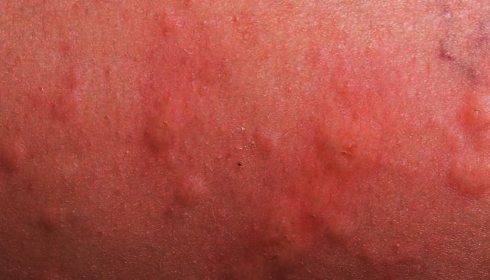
Aquagenic Urticaria
Water, crucial for daily life, is typically harmless for most people. However, a minority experience discomfort due to water allergy, scientifically known as aquagenic urticaria. This condition triggers hives upon skin exposure to water, requiring those affected to seek medical advice for accurate diagnosis and appropriate treatment.
Urticaria, which is also called hives, can show up on the body in different sizes, ranging from small to big. Aquagenic urticaria, or water allergy, is a rare condition where the hives are usually small (1–3 mm) and cause extreme discomfort due to itching.
This water allergy can be triggered by various sources of water, like sweat or tears. It's more common among women, and it can happen randomly or run in families. Researchers are still studying this condition.
There are other types of hives, like cold urticaria and cholinergic urticaria (heat hives), that are more common and might be confused with aquagenic urticaria. This article explores water allergies, covering symptoms, causes, diagnosis, and treatment, and answering common questions about aquagenic urticaria.
Symptoms of Aquagenic Urticaria may include hives triggered by a water allergy that can emerge within 20–30 minutes after skin exposure to water. Additional symptoms include skin lesions, a burning sensation, inflammation, skin redness, and itching. Less common symptoms may include difficulty breathing and wheezing. Typically, symptoms diminish once the skin is no longer in contact with water, usually within 30–60 minutes.
Though the precise factors contributing to water allergies remain uncertain, scientists suggest several mechanisms as potential pathways leading to a water allergy.
There's not much proof, but it seems water might be able to wash away things on your skin that cause allergies. This could make allergy cells, called mast cells, react either on the surface of your skin or deeper inside it, going through the top layer of your skin.
Another idea suggests that water might mix with the oils on the skin, called sebum, made by oil glands. This could irritate allergy cells and make them release histamines, which are proteins linked to allergies.
It's worth emphasising that the causes of aquagenicurticaria have not been extensively researched. Further investigation into the triggers of water allergies is essential for gaining a deeper understanding of the condition.
Finding out if someone has a water allergy includes doctors checking for symptoms and asking about the person's health history. They might do a water challenge test, where they put a warm, wet cloth on the skin for about 20 minutes at 95°F (35°C) to see if there's an allergic reaction. If allergic symptoms show up during this test, it means the person has a water allergy.
Also, the water challenge test helps distinguish aquagenic urticaria from other types of hives. Cold hives can be triggered by a cold cloth, and cholinergic hives can be triggered by a cloth that is too warm.
While there is currently no cure for water allergies, there are different ways to ease the symptoms. It's important to mention that because this condition is rare, scientists haven't studied its treatment extensively.
There are different ways to manage aquagenic urticaria, which is a condition where water causes skin reactions. Here are some options:
1. Take antihistamine pills. These can help because histamine is what causes the symptoms. These pills are taken by mouth.
2. Use creams on the skin: Putting special creams with petrolatum on the skin might help with the symptoms. These creams are absorbed by the skin.
3. Try phototherapy. If antihistamines and creams don't work, a doctor might suggest phototherapy. This treatment uses UV radiation, sometimes combined with antihistamines.
4. Take other medications: Some other medicines, like Stanozolol (an anabolic steroid), SSRIs (selective serotonin reuptake inhibitors), or omalizumab (an asthma medicine), might be prescribed to manage water allergies.
Scientists are not sure what exactly causes water allergies, but they have some ideas. One possibility is that histamine, released from certain cells, might be involved. This release could be triggered by a harmful substance or a water-soluble substance affecting pressure around hair follicles. However, water allergies can also happen without histamine being part of the problem.
Is it possible for someone to unexpectedly develop an allergy to water?
Research shows that water allergies usually start during or after puberty, and in some cases, they can occur in childhood. However, more research is required to completely understand this rare condition.
Water allergy, also known as aquagenic urticaria, causes hives when the skin comes into contact with water. If someone thinks they have this allergy, it's important to see a doctor. The symptoms of water allergy may look like those of other types of hives, like cold urticaria or cholinergic urticaria. A medical professional can provide an accurate diagnosis and the right treatment.